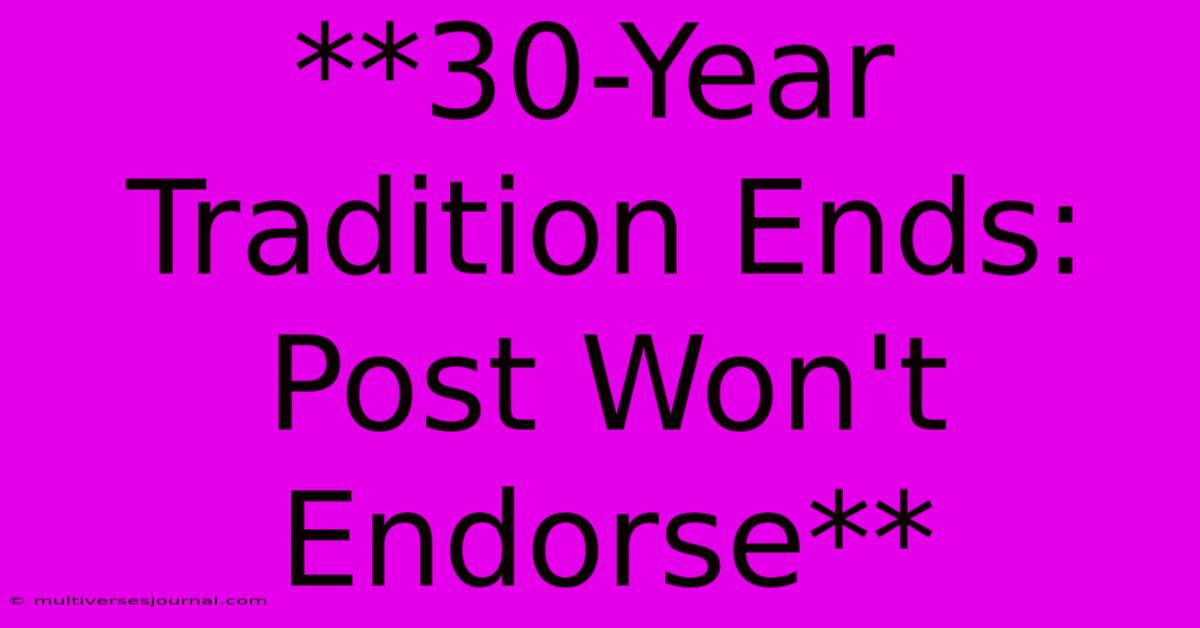**30-Year Tradition Ends: Post Won't Endorse**

Discover more detailed and exciting information on our website. Click the link below to start your adventure: Visit Best Website multiversesjournal.com. Don't miss out!
Discover more detailed and exciting information on our website. Click the link below to start your adventure: Visit Best Website mr.cleine.com. Don't miss out!
Table of Contents
30-Year Tradition Ends: Post Won't Endorse in Upcoming Election
A historic shift in the political landscape is underway as the iconic newspaper, The Post, has announced a groundbreaking decision: it will not endorse a candidate in the upcoming election. This marks the end of a 30-year tradition, leaving many questioning the reasoning behind this significant departure.
Why the Change?
The Post, known for its unwavering commitment to journalistic integrity, has cited a growing disillusionment with the current political climate as the primary reason for its decision. In a strongly worded editorial, the publication states that the "erosion of trust in institutions and the increasing polarization of political discourse" has made it impossible to endorse a candidate with a clear conscience.
A Shift in Public Opinion?
The Post's decision comes at a time of significant political upheaval. The rise of social media has created an echo chamber where individuals are increasingly exposed to information that reinforces their existing beliefs, leading to a widening gap between opposing political ideologies.
This dynamic has been further exacerbated by the spread of misinformation and disinformation, eroding trust in traditional media outlets. As a result, many publications are facing a decline in readership and struggling to maintain their relevance in an increasingly fragmented media landscape.
Implications for the Future
The Post's decision to break with tradition is likely to have a ripple effect on the media landscape. Other publications may follow suit, opting for a more neutral stance in an effort to maintain credibility and reach a wider audience.
However, the move is also likely to face criticism, with some arguing that it weakens the voice of the press in a democracy. Ultimately, the long-term implications of this shift remain unclear, but it represents a significant turning point in the relationship between the media and the public.
The Debate Continues
This unprecedented decision has ignited a fierce debate across the political spectrum. Supporters applaud the Post for its principled stand against the current political climate, while critics accuse the publication of abandoning its responsibility to inform and guide the public.
The decision is sure to spark further discussions about the role of the media in a democratic society. It remains to be seen whether this shift will lead to a more informed and engaged electorate or simply further exacerbate the already polarized political climate.
As the election draws nearer, the question of how the Post's decision will impact the campaign and the public's perception of the media remains at the forefront of the national conversation.

Thank you for visiting our website wich cover about **30-Year Tradition Ends: Post Won't Endorse**. We hope the information provided has been useful to you. Feel free to contact us if you have any questions or need further assistance. See you next time and dont miss to bookmark.
Thank you for visiting our website wich cover about **30-Year Tradition Ends: Post Won't Endorse**. We hope the information provided has been useful to you. Feel free to contact us if you have any questions or need further assistance. See you next time and dont miss to bookmark.
Featured Posts
-
Fire Breaks Out At Karaj Nuclear Facility
Oct 26, 2024
-
Trump Rogan Interview Date Time Topics
Oct 26, 2024
-
Phil Lesh Grateful Dead Co Founder Dies At 84
Oct 26, 2024
-
Irans Karaj Nuclear Plant Experiences Fire
Oct 26, 2024
-
Grateful Deads Phil Lesh Dead At 84
Oct 26, 2024
